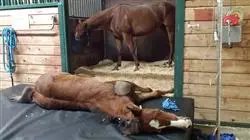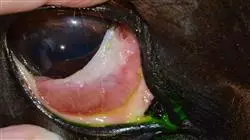University certificate
The world's largest faculty of veterinary medicine”
Introduction to the Program
A program designed to meet the specialization and refresher needs of professionals in the sector, with a high quality intensive course that covers each and every one of the areas of intervention in Equine Hospital Medicine"

Equine hospitalization requires extensive in-depth knowledge in order to understand how to intervene in the pathologies that affect quadrupeds. Equine hospitalization encompasses many pathologies, so a veterinary professional must update their knowledge to be aware of the latest developments.
The program will cover the foundations for specialization in equine hospital medicine, which define the logistics and clinical strategy needed in any hospital for horses. We will also delve into digestive disorders, which can present themselves with varied symptoms and evolution, and can represent a real challenge in terms of stabilization and treatment of the patient. In addition, we will address cardiac diseases in horses, which are relatively rare in relation to the pathologies they suffer.
The program will also analyze the respiratory system, neurological and muscular problems, neonatology, pathologies of the genitourinary system, endocrine problems, ophthalmic pathologies, parasitic diseases in horses and pathologies or diseases that vary according to age. To conclude this Master's Degree, hospital care of the surgical patient will be addressed, a fundamental part in the successful outcome of the surgical procedure performed when it has been carried out electively.
It is a 100% online program, without any face to face classes or pre-established schedules, which allows veterinary professionals to organize their time and schedule sessions whenever they wish from any mobile device with an Internet connection. In addition, the professional will be able to download all the academic content and study it as they wish, emphasizing specific topics and resolving doubts and concerns with a team of first class teaching staff.
Join the elite, with this highly effective program and open new paths to help you progress in your professional career"
This Master's Degree in Equine Hospital Medicine contains the most complete and up-to-date scientific program on the market. The most important features include:
- The latest technology in online teaching software
- A highly visual teaching system, supported by graphic and schematic contents that are easy to assimilate and understand
- Practical cases presented by practising experts
- State-of-the-art interactive video systems
- Teaching supported by telepractice
- Continuous updating and recycling systems
- Autonomous learning: full compatibility with other occupations
- Practical exercises for self evaluation and learning verification
- Support groups and educational synergies: questions to the expert, debate and knowledge forums
- Communication with the teacher and individual reflection work
- Content that is accessible from any fixed or portable device with an Internet connection
- Supplementary documentation databases are permanently available, even after the course
This comprehensive program has been created as an intensive route to specialization and refreshment that will allow the professional to boost their skills to the highest levels in this field"
TECH teaching staff is made up of professionals from different fields related to this specialty. Therefore, TECH ensures that it delivers the refreshment objective intended. A multidisciplinary team of professionals who are prepared and experienced in different settings will develop the theoretical knowledge in an efficient manner, but, above all, will provide the student with practical knowledge based on their own experience: one of the differential qualities of this program.
This mastery of the subject matter is complemented by the effectiveness of the methodological design. Developed by a multidisciplinary team of e-Learning experts, it integrates the latest advances in educational technology. This way, you will be able to study with a range of comfortable and versatile multimedia tools that will give you the effectiveness you need in your specialization.
The design of this program is based on Problem-Based Learning: an approach that views learning as a highly practical process. To achieve this remotely, telepractice will be used: with the help of an innovative interactive video system and Learning from an Expert, students will be able to acquire the knowledge as if they were facing the scenario they are learning at that moment. A concept that will make it possible to integrate and fix learning in a more realistic and permanent way.
With the experience of working professionals and the analysis of real success stories, in a high impact training"

With a methodological design based on proven teaching techniques, this innovative program will take you through different teaching approaches to allow you to learn in a dynamic and effective way"
Why study at TECH?
TECH is the world’s largest online university. With an impressive catalog of more than 14,000 university programs available in 11 languages, it is positioned as a leader in employability, with a 99% job placement rate. In addition, it relies on an enormous faculty of more than 6,000 professors of the highest international renown.

Study at the world's largest online university and guarantee your professional success. The future starts at TECH”
The world’s best online university according to FORBES
The prestigious Forbes magazine, specialized in business and finance, has highlighted TECH as “the world's best online university” This is what they have recently stated in an article in their digital edition in which they echo the success story of this institution, “thanks to the academic offer it provides, the selection of its teaching staff, and an innovative learning method aimed at educating the professionals of the future”
A revolutionary study method, a cutting-edge faculty and a practical focus: the key to TECH's success.
The most complete study plans on the university scene
TECH offers the most complete study plans on the university scene, with syllabuses that cover fundamental concepts and, at the same time, the main scientific advances in their specific scientific areas. In addition, these programs are continuously being updated to guarantee students the academic vanguard and the most in-demand professional skills. In this way, the university's qualifications provide its graduates with a significant advantage to propel their careers to success.
TECH offers the most comprehensive and intensive study plans on the current university scene.
A world-class teaching staff
TECH's teaching staff is made up of more than 6,000 professors with the highest international recognition. Professors, researchers and top executives of multinational companies, including Isaiah Covington, performance coach of the Boston Celtics; Magda Romanska, principal investigator at Harvard MetaLAB; Ignacio Wistumba, chairman of the department of translational molecular pathology at MD Anderson Cancer Center; and D.W. Pine, creative director of TIME magazine, among others.
Internationally renowned experts, specialized in different branches of Health, Technology, Communication and Business, form part of the TECH faculty.
A unique learning method
TECH is the first university to use Relearning in all its programs. It is the best online learning methodology, accredited with international teaching quality certifications, provided by prestigious educational agencies. In addition, this disruptive educational model is complemented with the “Case Method”, thereby setting up a unique online teaching strategy. Innovative teaching resources are also implemented, including detailed videos, infographics and interactive summaries.
TECH combines Relearning and the Case Method in all its university programs to guarantee excellent theoretical and practical learning, studying whenever and wherever you want.
The world's largest online university
TECH is the world’s largest online university. We are the largest educational institution, with the best and widest online educational catalog, one hundred percent online and covering the vast majority of areas of knowledge. We offer a large selection of our own degrees and accredited online undergraduate and postgraduate degrees. In total, more than 14,000 university degrees, in eleven different languages, make us the largest educational largest in the world.
TECH has the world's most extensive catalog of academic and official programs, available in more than 11 languages.
Google Premier Partner
The American technology giant has awarded TECH the Google Google Premier Partner badge. This award, which is only available to 3% of the world's companies, highlights the efficient, flexible and tailored experience that this university provides to students. The recognition as a Google Premier Partner not only accredits the maximum rigor, performance and investment in TECH's digital infrastructures, but also places this university as one of the world's leading technology companies.
Google has positioned TECH in the top 3% of the world's most important technology companies by awarding it its Google Premier Partner badge.
The official online university of the NBA
TECH is the official online university of the NBA. Thanks to our agreement with the biggest league in basketball, we offer our students exclusive university programs, as well as a wide variety of educational resources focused on the business of the league and other areas of the sports industry. Each program is made up of a uniquely designed syllabus and features exceptional guest hosts: professionals with a distinguished sports background who will offer their expertise on the most relevant topics.
TECH has been selected by the NBA, the world's top basketball league, as its official online university.
The top-rated university by its students
Students have positioned TECH as the world's top-rated university on the main review websites, with a highest rating of 4.9 out of 5, obtained from more than 1,000 reviews. These results consolidate TECH as the benchmark university institution at an international level, reflecting the excellence and positive impact of its educational model.” reflecting the excellence and positive impact of its educational model.”
TECH is the world’s top-rated university by its students.
Leaders in employability
TECH has managed to become the leading university in employability. 99% of its students obtain jobs in the academic field they have studied, within one year of completing any of the university's programs. A similar number achieve immediate career enhancement. All this thanks to a study methodology that bases its effectiveness on the acquisition of practical skills, which are absolutely necessary for professional development.
99% of TECH graduates find a job within a year of completing their studies.
Master's Degree in Equine Hospital Medicine
Prepare yourself to become an expert in the health and care of horses with the Master’s Degree in Equine Hospital Medicine offered by TECH Global University! Today, specialized veterinary care for horses is essential to ensure the well-being of these majestic animals. Our postgraduate program will equip you with the knowledge and skills necessary to provide optimal and advanced care for horses. One of the advantages of our program is that it is offered in an online format, allowing you to access content from anywhere, at any time. You won’t need to worry about travel or rigid schedules. You’ll have the flexibility to study at your own pace and tailor your learning to your needs.
Learn completely online about Equine Hospital Medicine
Our Master’s Degree in Equine Hospital Medicine focuses on the latest advancements in diagnosis, treatment, and management of common diseases and injuries in horses. You will learn about diagnostic imaging techniques, advanced therapies, equine internal medicine, and much more. The equine field requires highly trained professionals who can provide comprehensive care for horses. Upon completing this program, you will be well-prepared to face the clinical and medical challenges that may arise in your professional practice. Don’t miss the opportunity to advance your veterinary career and become an expert in Equine Hospital Medicine! Enroll in this Master’s Degree at TECH Global University and expand your knowledge in caring for these magnificent animals. Your passion for horses will take you to new professional heights!







